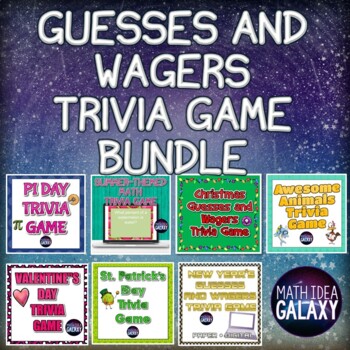Guesses and Wagers Math Trivia Game Bundle
Idea Galaxy
6.8k Followers
Grade Levels
5th - 9th
Subjects
Resource Type
Standards
CCSSMP2
CCSSMP3
Formats Included
- Zip
Idea Galaxy
6.8k Followers
What educators are saying
Great team building activity for the students! I used this with them at the beginning of the school year and plan to continue using them to help them learn how to collaborate.
My students enjoyed the competitive nature of the game itself. They enjoyed learning interesting facts and decided to make categories of their own to add to the slides.
I laminated the playing pieces to use over and over again. Great end of the year activity
Products in this Bundle (10)
showing 1-5 of 10 products
Description
Guesses and Wagers Math Trivia Game presents students with a series of interesting questions with a range of numerical answers. Students generate answers, then have to evaluate their confidence in their answers. It’s a fun game with a lot of solid math practice going on at the same time. Sneaky!
It is played in teams with the questions projected onto the board or a screen at the front of the room.
In this bundle you will get 7 different themed math trivia games that can be used through out the year in your math class.
Guesses and Wagers to be added later (if you purchase today you will get these games for free when they are added):
*Sports Guesses and Wagers
Total Pages
Answer Key
Included
Teaching Duration
N/A
Report this resource to TPT
Reported resources will be reviewed by our team. Report this resource to let us know if this resource violates TPT’s content guidelines.
Standards
to see state-specific standards (only available in the US).
CCSSMP2
Reason abstractly and quantitatively. Mathematically proficient students make sense of quantities and their relationships in problem situations. They bring two complementary abilities to bear on problems involving quantitative relationships: the ability to decontextualize-to abstract a given situation and represent it symbolically and manipulate the representing symbols as if they have a life of their own, without necessarily attending to their referents-and the ability to contextualize, to pause as needed during the manipulation process in order to probe into the referents for the symbols involved. Quantitative reasoning entails habits of creating a coherent representation of the problem at hand; considering the units involved; attending to the meaning of quantities, not just how to compute them; and knowing and flexibly using different properties of operations and objects.
CCSSMP3
Construct viable arguments and critique the reasoning of others. Mathematically proficient students understand and use stated assumptions, definitions, and previously established results in constructing arguments. They make conjectures and build a logical progression of statements to explore the truth of their conjectures. They are able to analyze situations by breaking them into cases, and can recognize and use counterexamples. They justify their conclusions, communicate them to others, and respond to the arguments of others. They reason inductively about data, making plausible arguments that take into account the context from which the data arose. Mathematically proficient students are also able to compare the effectiveness of two plausible arguments, distinguish correct logic or reasoning from that which is flawed, and-if there is a flaw in an argument-explain what it is. Elementary students can construct arguments using concrete referents such as objects, drawings, diagrams, and actions. Such arguments can make sense and be correct, even though they are not generalized or made formal until later grades. Later, students learn to determine domains to which an argument applies. Students at all grades can listen or read the arguments of others, decide whether they make sense, and ask useful questions to clarify or improve the arguments.


